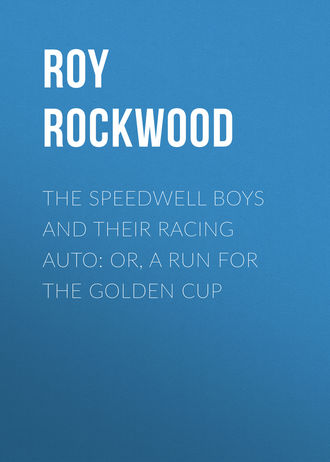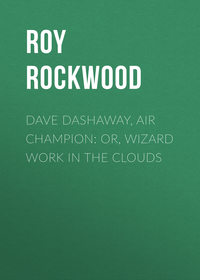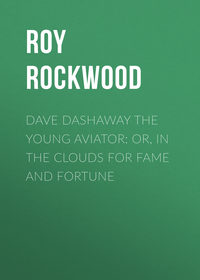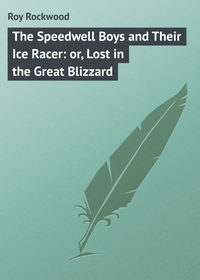 полная версия
полная версияThe Speedwell Boys and Their Racing Auto: or, A Run for the Golden Cup

Roy Rockwood
The Speedwell Boys and Their Racing Auto; Or, A Run for the Golden Cup
CHAPTER I
THE MANŒUVERS OF MAXEY
“Say, fellows! Look at what’s coming!”
“Oh, my eyes! See him wabble! Why, he’ll be over the wall into the river, machine and all, if he doesn’t watch out.”
“Say, Dan, did you ever see a fellow run a car as bad as Maxey? If we didn’t know better we’d think he had a fit,” declared Billy Speedwell, who sat with his brother, and several of their chums, on a high, grassy bank overlooking the Colasha River and above the road, a mile or two below Riverdale.
“He certainly does make a mess of it,” admitted the older Speedwell lad, gazing down the road, as were his friends, at a drab-painted automobile which was approaching them.
They were five boys, all members of the Riverdale Outing Club and all rode motorcycles which just now were leaning, in a row, against the bank. The chums had come out after school for a short spin into the country. It was fall, which fact was proven by the brilliant coloring of the leaves.
Beyond where the Riverdale boys lay on the short turf, and coming toward them, was the erratically-guided car. The drab racer seldom kept the middle of the road for a full minute at a time. It actually “wabbled,” just as Jim Stetson said.
And yet the fellow at the wheel of the machine had been driving it up and down the roads for nearly three months.
No instruction, and no practice, seemed to avail with Maxey Solomons, however. His father was one of the richest men in the county, and when Maxey expressed a wish to own and drive a car, Mr. Solomons made no objection. Indeed, the wealthy clothing manufacturer seldom thwarted the least of his son’s desires.
But the drab auto seemed aiming for trouble now. It nearly ran up the bank on the inner side of the road; then it shifted to the other side under the manipulation of Maxey at the steering wheel, just grazing the stone fence that separated the highway at this point from the sheer drop of fifty feet or more to the bank of the river.
“As sure as you live,” cried Monroe Stevens, “he’ll back over the dump!”
The boys with the motorcycles jumped to their feet the better to watch the manœuvers of the drab car and its owner. Shaving the stone wall, Maxey came back into the middle of the road and wabbled along for some rods toward the group of Riverdale youths.
Suddenly the spectators heard the purring of a fast moving car coming from the direction of the town. The road was quite straight for a couple of miles here; but there was a sharp turn behind the group of boys that hid the approaching car.
They knew it was coming at great speed. No warning was sounded on the horn as the car approached the turn. The driver of the unknown auto was very reckless.
Dan Speedwell was first to realize that Maxey Solomons was very likely to get into much more serious trouble than he was having at the moment, if the fast motor car swept around the corner upon him without any warning. It was well known that the only really successful way by which Maxey could pass any vehicle on the road, was by pulling out to one side, and stopping until the other machine went by!
Although moving so slowly, the drab car was steadily approaching the turn in the highway. Maxey was not two hundred yards from where the boys stood upon the grassy bank.
Knowing that he would only startle Maxey by running toward him, Dan leaped away in the other direction. He reached the turn in the road and saw the racing automobile coming in a cloud of dust.
Surely the reckless driver of the machine must slow down to round this curve. Dan Speedwell could see him plainly – a little, goggled-eyed fellow, completely disguised in coat and motor-cap, alone in the driver’s seat.
There were two passengers, however, and Dan knew that they must see him as he sprang out upon a jutting tree-root, and waved his cap wildly to attract their attention. One of the men leaned forward and tapped the chauffeur on the shoulder. He pointed to Dan above them on the bank; but the boy’s warning motions did not seem to do the least bit of good. The driver of the madly-running car did not reduce its speed.
On came the racing automobile, and the cloud of dust which traveled with it flew down to the curve in the road. The driver shifted his wheel and the machine took the turn on its outer tires, with the others in the air – Dan could actually see daylight between the wheels and the ground.
The boy saw, too, that it was a heavy touring car; that it was painted maroon, and that a blanket, or robe was trailing over the back of the tonneau, fairly dragging in the dust, in fact, and so hiding the plate on which was the license number.
Without a single blast of the horn the car charged around the bend. The group of boys on the bank yelled excitedly at Maxey down below. That erratic youth beheld the maroon car coming and literally “threw up his hands!”
The road was wide enough so that the racing car could have passed Maxey’s machine on the outside. But, unfortunately, it had stopped so that the rear wheels, bearing the larger weight of the car, was on the outer slope of the roadway, which was rounded to properly shed the water. The drab car began to run backward. Maxey did not know enough to put on the brakes.
The few seconds that elapsed after the fast-traveling auto came around the bend in the road would not have been sufficient for the chauffeur of that car to stop; and he merely swerved to the outer side of the road, intending to pass Maxey’s stalled car at full speed.
Maxey himself was immovable with terror at the appearance of the charging auto. He could not even leap from his seat. And when his own car began to run backward, directly into the path of the other machine, young Solomons only opened his mouth to emit a yell.
The drab car ran back into the shallow gutter. The stone wall behind it needed some repairs, several of the top layer of stones having fallen into the chasm below the road. This left the barrier at the spot scarcely eighteen inches high.
The unguided motor car ran back until its rear wheels came against this broken wall. The chauffeur of the maroon automobile swerved his car again, but only slightly. His heavier machine, running fast, charged down upon poor Maxey and his car like a huge battering-ram.
There was nothing the boys on the bank could do to save Maxey, or his car. And, at that late moment, there was little the wheelman of the maroon car could do to avert the catastrophe. His reckless driving of his machine made it impossible for him to stop in time.
The collision stopped Maxey’s cry of fright in the middle. The lighter car was flung up and backward by the swiftly moving and heavier touring automobile. The latter passed on in a flash, and practically unharmed. The drab car was flung over the low stone wall and, upside down, with the cushions and other gear raining from it, dropped into space.
CHAPTER II
DAN SPEEDWELL AT HIS BEST
Billy Speedwell, at the head of the other lads, leaped into the road and sprinted to the spot where Maxey’s automobile had been thrown over the embankment. They saw that the unfortunate youth had clung to his wheel; but he had gone out of sight with the wreckage.
Their interest in and sympathy for Maxey blinded them to the further actions of the maroon car and the three men in it. But Dan Speedwell, coming back toward the scene of the catastrophe, noted well the conduct of these men.
The chauffeur had made no proper attempt to avoid the collision; and now he neither slowed down nor glanced back to see what had become of the drab car and its driver.
When Dan Speedwell reached the place where his motorcycle rested beside the road, in company with those of the other boys, the maroon car was a mile away along the straight highway. There was plainly no intention on the part of the three men to stop and inquire as to the damage their car had done.
The other boys thought only of Maxey and his machine. Dan, angered by the indifference of the other automobilists, had no intention of letting them escape if he could help it. His mind was made up on the instant. He seized his wheel and rolled it out into the road.
The balloon of smoke which trailed the flying maroon car was already far down the road. It seemed impossible for a boy on a motorcycle to seek to overtake that flying vehicle. But Dan knew that farther on the automobile could not safely maintain its present pace, and he knew likewise the speed which he could get out of his machine.
Dan and Billy Speedwell had owned their motorcycles a short time only; but within that time they had learned to handle the machines with the best. Both at the Compton motordrome, and in the Riverdale baseball park the Speedwell boys had won high place in trials of speed. These races are narrated in the first volume of this series, entitled: “The Speedwell Boys on Motorcycles.”
Their Flying Feathers, the newest model produced by the Darringford Machine Shops, in Riverdale, had been given to the brothers by Robert Darringford whose life Dan and Billy had saved from a fire that had destroyed a part of the machine shop plant.
Their parents were not in circumstances to give the boys such expensive gifts as two hundred dollar motorcycles. Mr. Speedwell owned some dairy cows and a few acres of land on the outskirts of Riverdale, and Dan and Billy delivered the milk to their customers in town, even during the school terms. When this story opened it chanced to be a Saturday afternoon, or the Speedwell brothers would not have been idling here with their friends on the river road.
What Dan knew he could do under favorable conditions with his Flying Feather urged him to start in pursuit of the heartless trio who had left Maxey Solomons and his wrecked car to their fate.
Before the other boys missed him, Dan’s machine was popping like the explosion of an automatic gun, and he was several rods away from the scene of the collision. The youth settled himself firmly in his seat, opened his engine to almost its highest speed, and dashed away along the road.
The lad did not sight that car, however, for some time. The river road followed the winding course of the stream itself, and it was fringed with woods for a good part of the way. There were few dwellings on the highway between Riverdale and Upton Falls. The men in the car could have chosen no better stretch of road in the county for escape. There were likely to be few vehicles, and no constables at all at this hour of the day.
It was perilous to run so fast on a public road, even when the way was as smooth and well kept as this highway to Upton Falls. But the act of those men in the racing automobile had roused Dan Speedwell’s indignation. For all he knew, Maxey Solomons had met serious injury in the wreck of his auto; the men guilty of the crime must be apprehended.
On this hard track the automobile ahead left no trail; but for the first few miles Dan was positive that the maroon car had not gone into any by-way. In fact, there were no by-ways save into private estates, and those offered no escape for the fugitives.
The youth was quite sure that the men were strangers in the vicinity; he was confident that the car was not familiar to the locality, at least, for he and Billy were so much interested in the automobile game that there was not a car in this end of the county that they did not know.
The three men were strangers. They had deliberately made it impossible for anyone to read the numbers on the license behind the car. They were evidently of that reckless class of automobilists who ride through the country districts with regard for neither law nor safety.
A few moments only had elapsed since Dan started after the car when he reached the first public cross-road – a highway turning away from the river. But this road was macadamized, too, and offered no trace of the automobile’s wheels. However, Dan did not believe the trio in the maroon auto would turn aside, and he kept straight on.
Although the distance to Upton Falls was considerable, the pace of the motorcycle ate up the miles speedily. Dan and his steed of steel came soon to the outskirts of the town. The pedestrians he passed looked after the flying boy with wonder. Dan reached the head of Main street and, as he began its descent toward Market Square, and the hotel, he saw an automobile standing before the wide porch of the latter building.
The maroon car! Dan was sure of it even at that distance. The trio of reckless men who had perhaps injured Maxey Solomons had stayed their flight at the Falls hotel.
Even as Dan sped down the street, however, he observed that the men he followed were climbing into their car again. The blanket had been drawn in over the back seat of the car and the movements of the three were leisurely enough. They were probably convinced that there was no pursuit.
The boy saw several men in the square whom he knew. One was a deputy sheriff and this officer stepped quickly out into the street and held up his hand for Dan and his Flying Feather to reduce speed.
Dan shut off his engine. The maroon car was just starting. The short man at the wheel guided the auto carefully out into the road, and turned toward the highway that led to Barnegat.
“Stop them!” cried Dan, waving his hand at the departing auto. “Arrest those men, Mr. Polk!”
“What do you mean, Dan?” demanded the deputy, running along by the boy’s side as the Flying Feather slowed down.
“Do as I say! They’ve perhaps killed a boy up the road. At any rate, they smashed his automobile. Then they drove on, full tilt, and I followed them.”
“Nonsense, Dan! Not those men,” cried Mr. Polk.
“Yes they did. I tell you it was a maroon car, with three men in it. I was close enough.”
“To see the license numbers?” interrupted the deputy sheriff.
“They had the sign covered. But they came this way and I have followed them too closely to be mistaken. Stop them, I say!”
“Dan! you don’t know who these men are,” gasped Mr. Polk, as the motorcycle came to a halt and the excited boy leaped off.
“I don’t care who they are!” declared Speedwell, his righteous indignation still inspiring him. “I saw what they did – ”
“Are you sure? Can’t you be mistaken?”
“Didn’t they just come from Riverdale?”
“Ye-es. They came from that direction.”
“And I have been chasing them. There was no other car.”
“But the gentlemen are beyond suspicion of any such act as you relate, Dan!” cried the deputy sheriff. “One of them is Thomas Armitage, of Compton, and the other is Raleigh Briggs, who has offered the prize for the cross-country run of a thousand miles which is to be arranged next month – you’ve heard of it. Why, Dan, neither of them would allow his chauffeur to commit such an act of violence as you relate.”
CHAPTER III
THE MYSTERY OF THE MAROON CAR
Dan Speedwell was completely taken aback by this statement of the deputy sheriff. He knew that Mr. Polk must have surety for his words. The men in the maroon automobile were well known and perfectly responsible citizens.
Indeed, as Dan wheeled his motorcycle nearer to the car he saw that the two in the tonneau of the auto were much different-looking individuals from those he expected to find. The men who had wrecked Maxey Solomons’ auto, and perhaps killed the young man himself, would certainly not possess the personal appearance of these gentlemen!
Mr. Briggs Dan knew by reputation. He was the most enthusiastic motorist in Crandall County. The thousand mile endurance test which he had suggested, and to the winner of which he had promised a gold cup, interested Dan and Billy Speedwell not a little, although they owned no automobile, and at this time had no immediate expectation of getting a car.
“What does the young man want, Polk?” inquired Mr. Armitage, a gray-mustached man with a ruddy face and pleasant smile. “He asked us to stop; didn’t he?”
“There’s a mistake been made somewhere, Mr. Armitage,” declared the deputy sheriff, with some hesitation. “Dan is a good boy, and trustworthy. But it seems he has been following you and Mr. Briggs on his motorcycle – ”
“What for?” asked the gentleman, quickly.
“Because of something that happened up the road. He says that the automobile he followed wrecked another machine and hurt the driver.”
“Our auto?” cried Mr. Armitage.
“Why, Dan says it was a maroon car, like yours, and that it came direct from Riverdale.”
“By which road?” asked Mr. Briggs, quickly.
“The river road,” said Dan. “I was sure I had followed the right car – there was no other all the way.”
“But we did not come to the Falls that way,” said Mr. Briggs. “We traveled by the pike, and we stopped at Mr. Maury’s place for some minutes.”
“Oh, I know it could not have been your machine,” said Dan, hastily. “The men who ran down Maxey Solomons have escaped by some means. They must have taken a cross road toward the other side of the county.”
“You did not get their number?”
Dan quickly related the incidents which had brought him to this place, and in such haste. The gentlemen in the car were sympathetic and interested.
“Come!” said, Mr. Armitage, “this matter must be looked into. The rascals should be apprehended. They are getting farther and farther away each minute, it is likely. Come, Briggs, what do you say? You have been bragging about the speed of this car. Let’s see what Henri can get out of her.”
“I am with you, Armitage,” declared his friend. “Hop aboard, Polk. You are a county officer. Those men must be arrested, if possible, and held until we learn what damage they have done.”
“I’ll go with you, Mr. Briggs,” said the deputy.
He leaped into the tonneau. Mr. Armitage looked at Dan, who stood by his motorcycle.
“The boy had better go with us,” said Mr. Armitage. “He is evidently an observant lad, and he will not be likely to make a second mistake in the automobile.”
“Yes! let the boy come,” said Mr. Briggs. “If he was a witness to the accident he speaks of, we will need his testimony if we overtake the guilty ones.”
“But my machine?” said Dan, doubtfully.
“Lift it right up here,” commanded Mr. Briggs. “We’ll fasten it on the running board. Then, young man, you get in beside Henri, and we’ll be off.”
Dan was quick to obey these suggestions. His Flying Feather he stood upright on the running board of the car, and he saw that it was fastened securely. In five minutes they were off, after Mr. Polk left word at the sheriff’s office for the officers to watch for the mysterious car and its three occupants.
The auto dashed off along the pike toward Riverdale. There were three cross roads that the offenders against law might have taken, as long as they did not complete their run to Upton Falls. But there were by-roads, too, on which they might have hidden and the deputy sheriff advised stopping to inquire at every farmhouse, and of every teamster whom they met. It was some time, however, ere they picked up the trail of the maroon car, and then they obtained the clue in quite a strange way.
As they came to the lane leading up to a barn, the farmer came running out with a pitch fork in his hand. Before Mr. Polk could speak, the man demanded:
“Ye got ’em, hev ye, Sheriff? Wa’al I’m glad of it! I’ll go right down with ye t’ th’ ’squire’s office, an’ I guess, he’ll make ’em pay a pretty price for their fun. That calf of mine run int’ a barbed wire fence an’ tore herself all up – ”
“Hold on, Mr. Jackson!” exclaimed the deputy. “You’re getting your dates mixed, I guess. These gentlemen certainly have done you no harm.”
“No harm!” yelled the farmer. “When they come up through the Indian Bridge road not an hour ago, they skeered my heifer into a conniption fit, and come pretty nigh runnin’ over me when I come out at ’em.”
“Not these gentlemen,” said Polk. “I can vouch for them. One is Mr. Thomas Armitage, whom you ought to know, Jackson.”
“I swan!” exclaimed the farmer. “I voted for him for Congress.”
“Much obliged to you, I am sure,” said Mr. Armitage. “And I hope that you will not think I so illy deserved your vote as to race an automobile through these roads to the endangering of life and limb of good citizens.”
“Wa’al!” ejaculated the puzzled Mr. Jackson, “it was a car jest the same color as yours, Mr. Armitage.”
“And how many men were in it, Mr. Jackson?” interposed Polk.
“Come to think on’t, there warn’t but three,” admitted the farmer.
“Did you see the license number?”
“Not much! They went so quick I couldn’t see much but the color of the car.”
“And in which direction did they disappear?” asked the deputy.
The farmer pointed up the side road, away from the river.
“They are making for the railroad,” declared Mr. Briggs, in some excitement. “Drive ahead, Henri.”
They came to the railroad – the Barnegat & Montrose Branch of the R., V. & D. – and halted long enough to speak to the flagman. He had seen the flying car, too. They were on the right track.
But a mile beyond the pursuing party came to a place where the highway branched in three directions. There was no house in sight. The escaping car might have taken any one of the roads.
“We’re stuck!” ejaculated Mr. Polk. “We might as well take one at random and see if we can run down a clue upon it.”
“Wait!” urged Dan Speedwell. “Perhaps I can do better than that.”
He got out of the machine and ran into the first road at the right. He had noticed that these highways here were not so well made as those nearer the river. There was a chance that he might find some trace of the passing of the strange car which they followed.
And he was right in this surmise, although he did not find it in this first road. Marks of the tires of an automobile – and fresh marks – were visible in the middle road. As far as Dan could see no other machine had passed this way.
He leaped back beside the chauffeur and they drove on again at top speed. A mile beyond they halted at a farm house to inquire. The passing of an automobile in a cloud of dust had been noticed less than an hour before; but the sight was too common to have attracted much attention, and the occupants of the house had been too far from the road to note the color of the machine, or the number of men in it.
Mr. Briggs’ car was certainly fast, and Mr. Briggs’ chauffeur was the most marvelous manipulator of an automobile that Dan Speedwell had ever seen. And to sit directly beside the Frenchman and observe the skill and art with which he handled the levers and the wheel was a sheer delight to the boy.
He thought to himself:
“Ah! if Billy and I only owned an auto! If we could only take part in this endurance test that Mr. Briggs is going to arrange! If we could handle an auto half as well as this Frenchman!”
But the boy’s thoughts were disturbed suddenly by Mr. Polk, who remarked:
“It looks to me as though these fellows were aiming for Port Luther, or even Cadenz. Unless they turn back toward Riverdale and Compton they will be obliged to strike some of the coast towns.”
“Quite right, Polk,” admitted Mr. Armitage.
“Then, here is Landers Station just ahead. There is a train coming down now. I’ll take that train and go on. The railroad is more direct than the highways and I may be able to head those fellows off at Port Luther.”
“And we stick to the trail in the car, Polk!” agreed the gentleman. “What do you say, Briggs?”
“It suits me. Henri, shall I take your place for a while?” Mr. Briggs asked his chauffeur.
“The young man here will change with me, Monsieur,” returned the kindly Frenchman, who had seen how eagerly interested Dan was in the management of the automobile.
And when they halted at the railroad station to allow the deputy sheriff to take the train, the chauffeur did indeed change places with Dan Speedwell. Once at the wheel the youth proved that Henri had not been mistaken in him. For a lad of sixteen Dan handled the car with great dexterity.
The maroon car was out of sight of the station before the train bearing the deputy was on its way again; but the automobilists were obliged to halt frequently to inquire for the motor car of which they were in pursuit. And there were more autos than one ahead of them now. Sometimes they lost the trail of the maroon car completely; but when they reached the lively little town of Larned they learned that the fugitives had halted at the local garage for gasoline, and that they had left, still following the road toward the coast, but at a moderate pace.







